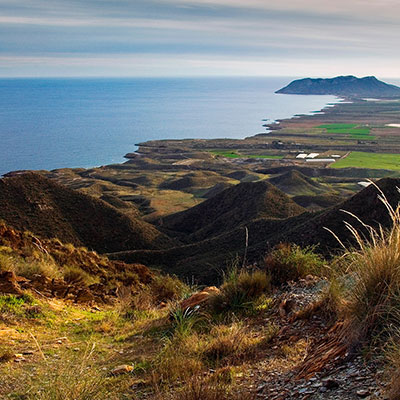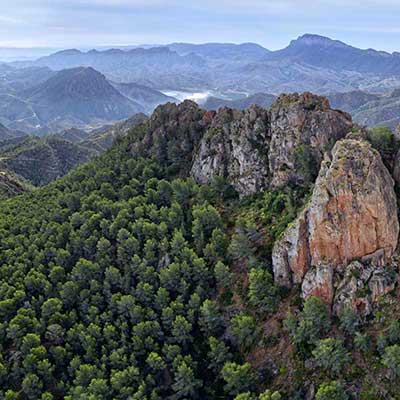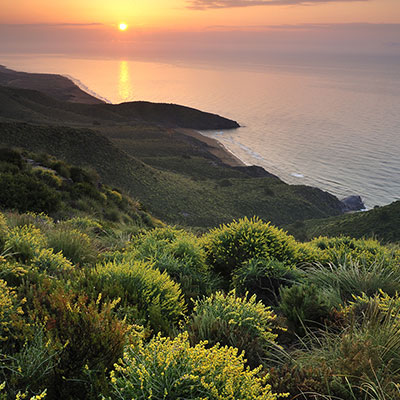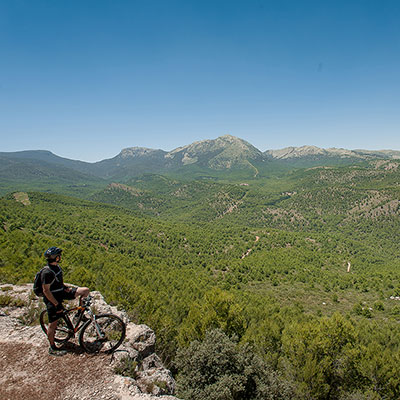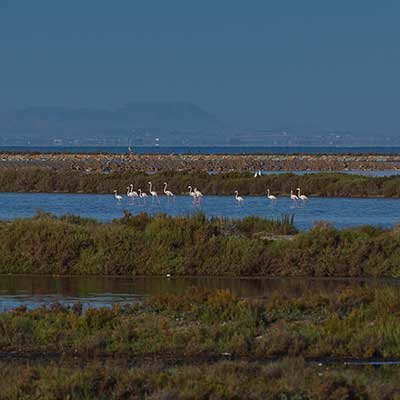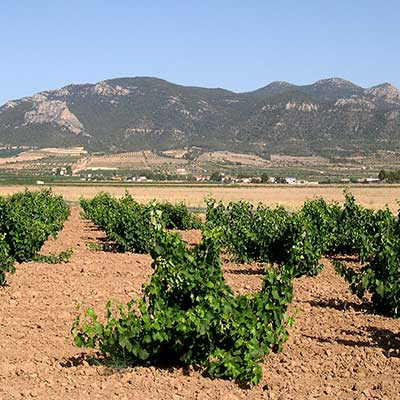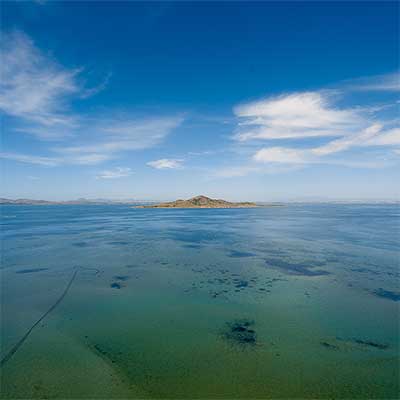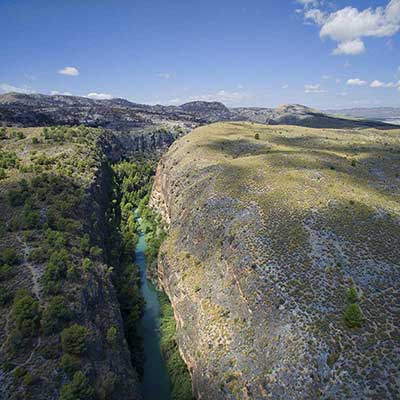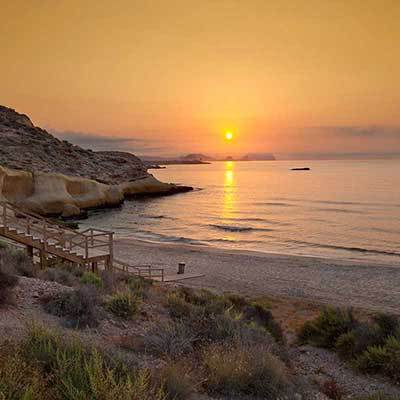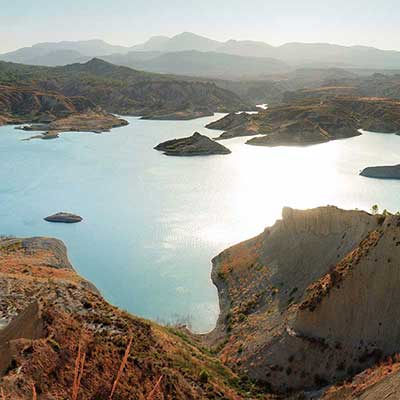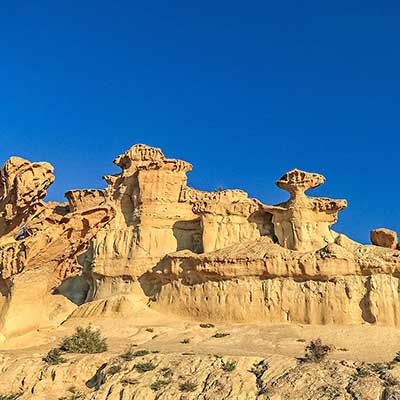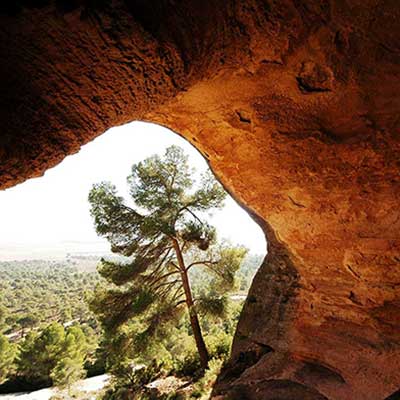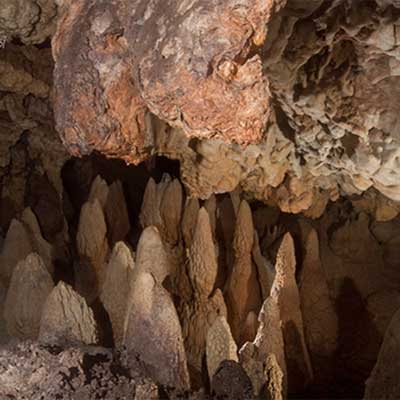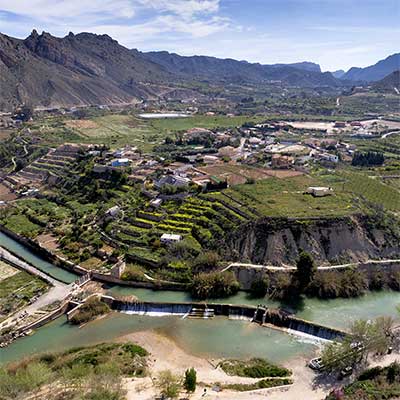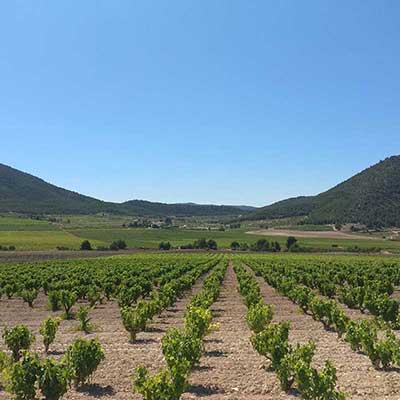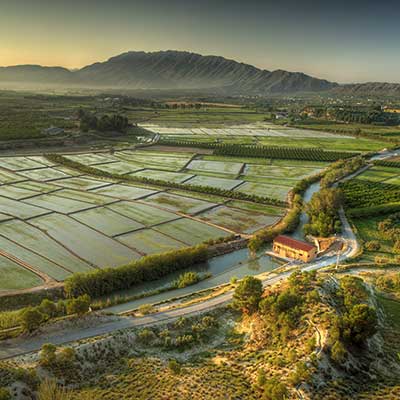COSTA CÁLIDA. REGION OF MURCIA. A WIDE RANGE OF LANDSCAPES IN A FEW KILOMETRES
Nature for all five Senses
"Nature for all five Senses" is a set of experiences that we have carefully selected so that you can savor each moment, feeling like time has stopped, focusing on your well-being and the benefits that nature can give you.
Read MorePhoto gallery
Discover
Sustainable
Tourism
Do you want to be inspired?
Vías Verdes
The greenways are old disused railway routes, adapted to become ecotourism itineraries for hikers and touring cyclists.
Sierra Espuña Route
A great tourist resource which allows you to enjoy the Region of Murcia's most emblematic natural setting while mountain-biking.
Sports and Adventure
Active tourism is one of the great proposals, regarding leisure related to nature, offered by the Region of Murcia.
Rural and Inland Tourism
The interior of the Murcia Region is ideal for those in search of relaxation, nature, sport and good food.
Top 10
Come and visit the most awesome natural spots in the region. Beaches, mountains, canyons, valleys... Here, we'll show you the best places to escape to, where to breathe clean air and to enjoy the amazing spectacles of nature.
MOUNTAIN OF ASHES
From the viewpoint of Monte de Cenizas, you can see some stunning views of Mar Menor, the Mediterranean Sea and even the coast of Africa. The Regional Park of Calblanque is located on the most easterly point of the coastline. Despite its small size, there are a variety of geological structures and materials that can be found in Calblanque. As a result, it is possible to find fossil dunes, cliffs, beaches, sedimentary rocks such as limestone or metamorphic rocks such as shales and phyllites.
CAÑAVEROSA
In the Nature Reserve of Cañaverosa you could lose yourself in some of the best riverside forests in the Region of Murcia. Through the northwest of the region run the first few kilometres of the River Segura on its way to Murcia. This Nature Reserve is home to one of the best riverside forests of the region, it's a sort of 'ecosystem' of great value not only for its scarcity on a regional level, but also for the diversity of life forms that it welcomes.
CALBLANQUE
The landscape of the Regional Park of Calblanque, is one of the best preserved in the whole region. It offers a great combination of beach and mountain. The Regional Park of Calblanque is located on the most easterly point of the coastline. Despite its small size, there are a variety of geological structures and materials that can be found in Calblanque. As a result, it is possible to find fossil dunes, cliffs, beaches, sedimentary rocks such as limestone or metamorphic rocks such as shale and phyllites.
ALMADENES
Almadenes is one of the most incredible landscapes of our region - a deep canyon river ideal for the more adventurous. The Northeast retains the best network of river ecosystems in the region. Almadenes, in between Calasparra and Cieza, is an area where the River Segura excavates a deep canyon running along its floor, sometimes calm and sometimes rough. The dominant geological materials are limestone.
SIERRA ESPUÑA
The Sierra Espuña Mountain Range is one of the greenest and most dense landscapes of Murcia. It's an ideal place to forget about problems and breathe pure air. Sierra Espuña has the largest forest of the Region of Murcia and one of the most emblematic natural environments; it is thanks to the efforts in afforestation and reforestation carried out at the end of the last century for today's green and dense forests.
SALINAS DE SAN PEDRO
Las Salinas y Arenales de San Pedro form the most important wetlands of the region. There you will be able to see flamingos and all kinds of birds. Las Salinas de San Pedro Regional Park, despite its small space, hides sedimentary rocks formations and sand dunes. It is a good example of the transformation of an old coastal lagoon into salt flats that are still active. This Park is located at the northernmost point of the Mar Menor.
THE RICOTE VALLEY
Valle de Ricote, with its Moorish air, is one of the best Spanish landscapes. You will be surrounded by palm trees, citrus trees and waterwheels. If any place exists where you can still feel the Arabic culture, it is Valle de Ricote. The following towns, Abarán, Archena, Blanca, Cieza, Ojós, Ricote, Ulea and Villanueva del Segura, have formed a dense vegetable garden, that meanders along the wetlands of the River Segura and transports you to an idyllic world.
FUENTES DEL MARQUES
Fuentes del Marqués is an ideal landscape to go with the family. It stands out for its water springs and abundant foliage. This Natural Reserve, one of the great attractions in the town of Caravaca, is listed as a historic site. This spot owes its name to its previous owners, the marquises of San Mamés, and of course to the birth of several springs of crystal-clear water.
RIVER CHICAMO
The countryside in the surrounding areas of the River Chícamo is known as the Murcian Palestine for its abundance of palm trees and desert lands.
BOLNUEVO EROSIONS
In the Erosiones de Bolnuevo, you will find one of the most unusual landscapes of the Region that has been shaped by water and wind. These erosions, located on the beachfront, set up an extraordinary natural landscape in which the wind and water erosion have formed whimsical shaped rocks.
Top 10
Cultural, sports, ecotourism, even magical. There are routes to suit all ages and tastes. Take a look at our suggestions and get ready to discover the region. Don't forget your camera and wear comfortable shoes, because there is a long way to walk...
WATERWHEELS
Discover the importance of water in the Valle de Ricote as you walk all over the Waterwheels Route, which raise the river water towards the furthest areas. By walking along the banks of the River Segura you will learn about the work in traditional orchards and the customs of the inhabitants. The Big Waterwheel of Abarán is the largest functioning waterwheel in Europe.
WINE ROUTES
In the Region of Murcia, you can choose between three different wine routes: Yecla, Bullas and Jumilla. All 3 are certificated by ACEVIN (Spanish Association of Cities of Wine). Thanks to these routes, you can try our wonderful wines with Denomination of Origin, but you can also learn about the culture and the heritage of some charming little villages. If you love experiences, come and try this one.
COAST ROUTES
Either bike rides or walks near the beach. There are different routes in the Mar Menor area that you can do. It only depends on the difficulty and how you want to go about it. Hikers can follow several routes, either along cliffs and fossil dunes or sand paths. It is clear that spring and autumn are the best seasons to do these activities.
ECOTOURISM ROUTE
If you love long walks, the Northeast Green Route is your best option. This 80 km walk covers the old railway line that used to link the city of Murcia with Caravaca de la Cruz. It can also be traversed by bike or on horseback. It has different stretches where nature and heritage are mixed, as they go through some of the most beautiful villages in the region. If you decide to explore the whole region, get informed about the available hostelling network.
BAROQUE ART IN MURCIA
Strolling in the city of Murcia means walking through the Baroque era and admiring some 18th Century treasures, such as the Cathedral façade, designed by Jaime Bort. Most of the Baroque buildings here are religious institutions, among which the San Miguel, Santa Eulalia and San Juan churches stand out. But there is an essential reason for which Baroque art is so important in Murcia: Francisco Salzillo. The museum dedicated to this sculptor hosts some of his most important works, such as those that form La Santa Cena (Last Supper) or La Oración en el Huerto (Christ praying in the Garden), which are carried in the procession of Good Friday in the morning.
ALL ABOARD THE TRAIN!
If you like trains, you have to try the Railway Route of Águilas (Ruta del Ferrocarril de Águilas). This sightseeing tour will take you to the Embarcadero del Hornillo, a majestic mineral Pier built in 1903 which is still in place crossing the Mediterranean Sea. Moreover, you will visit the Railway Museum, where there are several model trains in motion. But these are only two of all the interesting stops that the route offers.
Senderos Azules
The Region of Murcia has 15 Blue Trails, making it the single-province community with the most of these trails. The Blue Trails, awarded by ADEAC, distinguish routes near the sea with a blue flag and, recently, inland trails in perfect condition.
ROMAN FOR A DAY
Follow the Romans' steps in Cartagena and find out what the ancient Carthago Nova was like. In the age of the Emperor Augustus, Carthago Nova was one of the most important ports in the Mediterranean Sea. Here you have a wide range of choices: from visiting a forum or a temple to being in an ancient patrician house and admiring its beautiful mural paintings. But that's not all: you can also go all over the Roman Theatre together with its architect, the great Vitruvius, who will tell you all the secrets of this masterful building.
OPEN DURING RESTORATION
How does a city and its heritage recover after an earthquake? In the city of Lorca you will get the answer by means of the route called Abierto por restauración, which will take you to the most touristic places in the City of the Sun in order to show you before and after of the earthquake. The Palacio de Guevara, the Ex Colegiata de San Patricio and the Iglesia de Santo Domingo are some of the best examples. Finally, you can make the most of your visit and learn about the heritage of Jewish culture by going to the old Jewish quarter and the Synagogue.
PILGRIMAGE SITES
Go on a pilgrimage in the holy city of Caravaca de la Cruz and discover the mysteries of this city of legend. You can see the house in the Calle de la Corredera where San Juan de la Cruz stayed when he visited the city and admire some beautiful churches such as the Compañía de Jesús and the convent of Santa Clara, the only enclosed convent that remains active in Caravaca. You can also walk from the medieval quarter to the Basílica-Santuario de la Vera Cruz (True Cross Sanctuary), where they will tell you the mysteries around the sacred relic and its miracle appearance in 1231.





